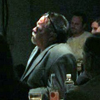The master trumpeter and composer Wadada Leo Smith made a rare San Diego appearance on Jan. 21 to showcase his Pulitzer Prize-nominated suite of compositions, "Ten Freedom Summers," in the acoustically superb Conrad Prebys Music Hall at UC San Diego.
Smith was joined by pianist Anthony Davis and bassist John Lindberg, both long-time associates. Percussionist Lynn Vartan completed the Golden Quartet. Much of the evening’s music was also augmented by a small chamber orchestra of violinists Shalini Vijayan and Mona Tian, the viola of Miguel Atwood Ferguson, the cello of Judith Hamman and the double-bass of Kyle Motl, with clarinetist Felipe Rossi and flutist Ine Vanoeveren completing the ensemble.
The first two compositions showcased the Golden Quartet. "Dred Scott: 1857, the Issuers of Human Rights," featured Smith's long, turgid tones coursing over Vartan's dramatic percussion, the rumbling harmonies of Davis and the tremolo bowing of Lindberg. Smith hunched forward so that his trumpet was aimed at the hardwood stage floor, yet his sound still soared into the ether.
It was difficult to tell when "Dred Scott" ended and "Al Hajj Malik Al Shabazz and the People of the Shahada" (dedicated to Malcolm X) began, but Lindberg's hornet's nest bowing and Davis' agitated piano united both pieces with a profound sense of melancholy. Lindberg's deep indigo sighs were particularly affecting.
That melancholy morphed into horror for "Emmett Till: Defiant, Fearless," fueled by Smith's violent sputtering and Lindberg's flamenco-strummed triple stops. The sound reached a critical mass when the five string players layered chilling intervals along Vartan's haunted vibraphone textures. A huge screen hung from the ceiling, on which video artist Jesse Gilbert activated a series of images that toggled from archival photos to live video of the musicians on stage. Portraits of Till, the composition's namesake, seemed to be enveloped by bright luminous fibers as the strings droned in clouds of dissonance penetrated by the virtuosic stabs of Hamann's cello.
The orchestral swell became sonically delirious with the shift into "John F. Kennedy's New Frontier and the Space Age," a sprawling, emotionally charged piece that orbited around extremes of bold lyricism and distant trepidation, aided enormously by the siren-like wails of the violins and the funereal beats of Vartan's percussion.
Vibes and piano locked into a sonic debate for "Democracy," which also birthed a glorious virtuosic feature from Davis, who reminded me of free ragtime, followed by Smith's narrative control of dynamics. Rarely has any trumpeter made more music from fewer notes. "Democracy" concluded with a sparkling drum solo. Later on, Smith described the experience as "messy" -- kind of like real democracy.
Smith conducted the string quartet of Vijayan, Tian, Ferguson and Hamann for the stunning "Black Church," a piece that soared, seared and cauterized with rich and disturbing use of pizzicato and ponticello glissandi.
After a brief and poignant speech to summarize the preceding events, Smith concluded the evening with another sprawling masterwork, "Martin Luther King Jr.: Memphis Prophecy," centered around an inch-worm ostinato dialog between Smith and Davis, then Lindberg and Vartan. As video images of King swirled in the background, Smith reached into the heavens with his brilliant clarion call. His ideas are even more profound because he delivers them with an economy of choices wise enough to make Warren Buffett jealous.
The full orchestra ratcheted up the music several turns toward a rapturous conclusion, even as a sense of gloom pervaded -- an amazing night of music that referenced our troubled history as a nation and still managed to inspire us as individuals to be the change we want to see. Music rarely gives you that much to think about, or hope for.

Robert Bush is a freelance jazz writer who has been exploring the San Diego improvised music scene for more than 30 years.

